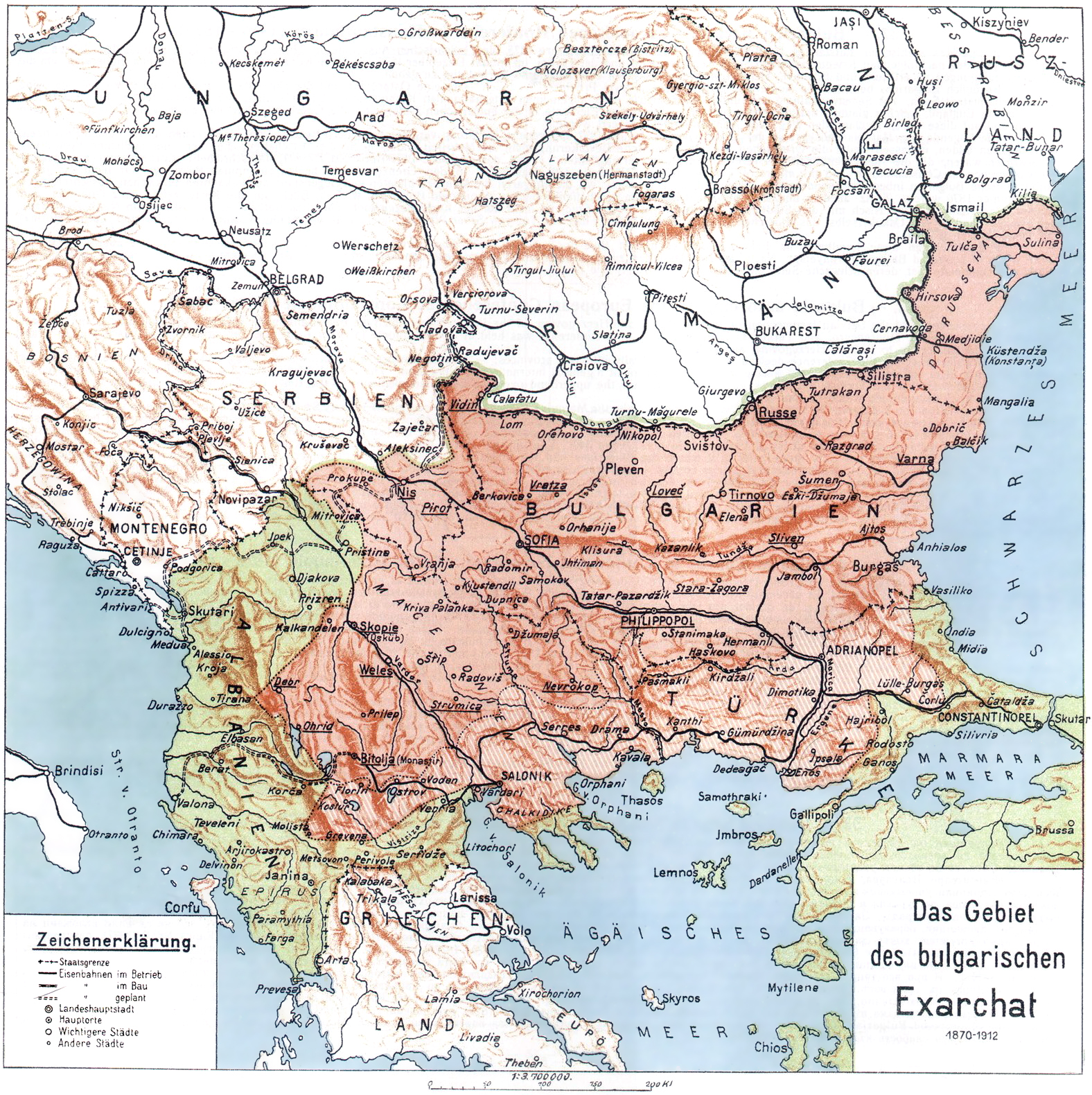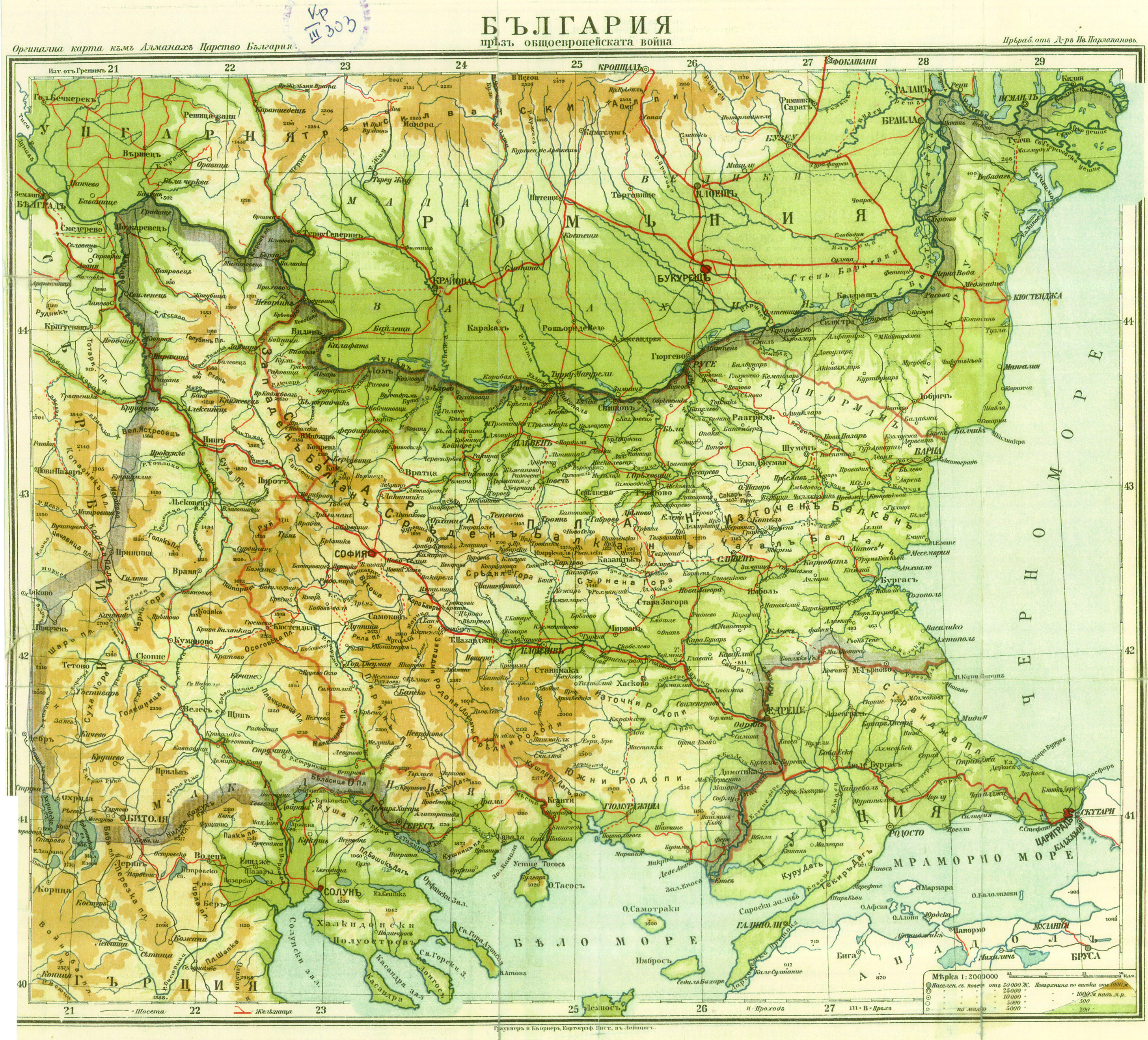|
Greater Bulgaria
Bulgarian irredentism is a term to identify the territory associated with a historical national state and a modern Bulgarian irredentist nationalist movement in the 19th and 20th centuries, which would include most of Macedonia, Thrace and Moesia. History The larger proposed Bulgarian state was suggested under the Treaty of San Stefano in 1878. The issue of irredentism and nationalism gained greater prominence after the Treaty of San Stefano. It established a Principality of Bulgaria, with territory including most of Moesia - the plain between the Danube and the Balkan mountains range (Stara Planina), the regions of Sofia, Pirot, and Vranje in the Morava Valley, Thrace - Northern Thrace, parts of Eastern Thrace, and nearly all of Macedonia. This treaty laid grounds for much of the later claims for a Greater Bulgaria. However, the Treaty of San Stefano was a preliminary one, and the borders of the newly created Bulgaria were established in the Treaty of Berlin. It saw t ... [...More Info...] [...Related Items...] OR: [Wikipedia] [Google] [Baidu] |
Morava Valley
The Morava Valley ( sr, Поморавље / ''Pomoravlje'', ), is a general term which in its widest sense marks valleys of any of three Morava rivers in Serbia: the West Morava ( West Morava Valley), the South Morava (South Morava Valley) and the Great Morava (Great Morava Valley). In the narrow sense, the term is applied only to the Great Morava Valley ( sr, Велико Поморавље / ''Veliko Pomoravlje''). The Serbian term follows the general manner of coining river valley names in Serbian using the prefix ''po-'' and suffix ''-je'', meaning literally "(land) along the Morava". Morava valley lies in the central Balkans, at the crossroads which lead eastwards, towards the Black sea and Asia Minor, and further south, down the Vardar river into the Aegean sea. The West Morava Valley Location The West Morava Valley ( sr, Западно Поморавље / ''Zapadno Pomoravlje'') is the valley of the West Morava. It is the southernmost Peripannonic region of Se ... [...More Info...] [...Related Items...] OR: [Wikipedia] [Google] [Baidu] |
Romania
Romania ( ; ro, România ) is a country located at the crossroads of Central, Eastern, and Southeastern Europe. It borders Bulgaria to the south, Ukraine to the north, Hungary to the west, Serbia to the southwest, Moldova to the east, and the Black Sea to the southeast. It has a predominantly temperate- continental climate, and an area of , with a population of around 19 million. Romania is the twelfth-largest country in Europe and the sixth-most populous member state of the European Union. Its capital and largest city is Bucharest, followed by Iași, Cluj-Napoca, Timișoara, Constanța, Craiova, Brașov, and Galați. The Danube, Europe's second-longest river, rises in Germany's Black Forest and flows in a southeasterly direction for , before emptying into Romania's Danube Delta. The Carpathian Mountains, which cross Romania from the north to the southwest, include Moldoveanu Peak, at an altitude of . Settlement in what is now Romania began in the Lower Pale ... [...More Info...] [...Related Items...] OR: [Wikipedia] [Google] [Baidu] |
Southern Dobruja
Southern Dobruja, South Dobruja or Quadrilateral ( Bulgarian: Южна Добруджа, ''Yuzhna Dobrudzha'' or simply Добруджа, ''Dobrudzha''; ro, Dobrogea de Sud, or ) is an area of northeastern Bulgaria comprising Dobrich and Silistra provinces, part of the historical region of Dobruja. It has an area of 7,566 km² and a population of 358,000. It was a part of Romania ''de jure'' from 1913 to 1918 (''de facto'' from 1913 to 1916) and again from 1919 to 1940. History At the beginning of the modern era, Southern Dobruja had a mixed population of Bulgarians and Turks with several smaller minorities, including Gagauz, Crimean Tatars and Romanians. In 1910, of the 282,007 inhabitants of Southern Dobruja, 134,355 (47.6%) were Bulgarians, 106,568 (37.8%) Turks, 12,192 (4.3%) Roma, 11,718 (4.1%) Tatars, and 6,484 (2.4%) Romanians. Southern Dobruja was part of the autonomous Bulgarian principality from 1878 and part of the independent Bulgarian state from 1908 until Bulg ... [...More Info...] [...Related Items...] OR: [Wikipedia] [Google] [Baidu] |
World War II
World War II or the Second World War, often abbreviated as WWII or WW2, was a world war that lasted from 1939 to 1945. It involved the World War II by country, vast majority of the world's countries—including all of the great powers—forming two opposing military alliances: the Allies of World War II, Allies and the Axis powers. World War II was a total war that directly involved more than 100 million Military personnel, personnel from more than 30 countries. The major participants in the war threw their entire economic, industrial, and scientific capabilities behind the war effort, blurring the distinction between civilian and military resources. Air warfare of World War II, Aircraft played a major role in the conflict, enabling the strategic bombing of population centres and deploying the Atomic bombings of Hiroshima and Nagasaki, only two nuclear weapons ever used in war. World War II was by far the List of wars by death toll, deadliest conflict in hu ... [...More Info...] [...Related Items...] OR: [Wikipedia] [Google] [Baidu] |
Macedonian Front (World War I)
The Macedonian front, also known as the Salonica front (after Thessaloniki), was a military theatre of World War I formed as a result of an attempt by the Allied Powers to aid Serbia, in the autumn of 1915, against the combined attack of Germany, Austria-Hungary and Bulgaria. The expedition came too late and in insufficient force to prevent the fall of Serbia, and was complicated by the internal political crisis in Greece (the "National Schism"). Eventually, a stable front was established, running from the Albanian Adriatic coast to the Struma River, pitting a multinational Allied force against the Bulgarian Army, which was at various times bolstered with smaller units from the other Central Powers. The Macedonian front remained quite stable, despite local actions, until the great Allied offensive in September 1918, which resulted in the capitulation of Bulgaria and the liberation of Serbia. Background Following the assassination of the Crown Prince by a Bosnian Serb, Aust ... [...More Info...] [...Related Items...] OR: [Wikipedia] [Google] [Baidu] |
Second Balkan War
The Second Balkan War was a conflict which broke out when Bulgaria, dissatisfied with its share of the spoils of the First Balkan War, attacked its former allies, Serbia and Greece, on 16 ( O.S.) / 29 (N.S.) June 1913. Serbian and Greek armies repulsed the Bulgarian offensive and counter-attacked, entering Bulgaria. With Bulgaria also having previously engaged in territorial disputes with Romania and the bulk of Bulgarian forces engaged in the south, the prospect of an easy victory incited Romanian intervention against Bulgaria. The Ottoman Empire also took advantage of the situation to regain some lost territories from the previous war. When Romanian troops approached the capital Sofia, Bulgaria asked for an armistice, resulting in the Treaty of Bucharest, in which Bulgaria had to cede portions of its First Balkan War gains to Serbia, Greece and Romania. In the Treaty of Constantinople, it lost Adrianople to the Ottomans. The political developments and military preparations f ... [...More Info...] [...Related Items...] OR: [Wikipedia] [Google] [Baidu] |
First Balkan War
The First Balkan War ( sr, Први балкански рат, ''Prvi balkanski rat''; bg, Балканска война; el, Αʹ Βαλκανικός πόλεμος; tr, Birinci Balkan Savaşı) lasted from October 1912 to May 1913 and involved actions of the Balkan League (the Kingdoms of Bulgaria, Serbia, Greece and Montenegro) against the Ottoman Empire. The Balkan states' combined armies overcame the initially numerically inferior (significantly superior by the end of the conflict) and strategically disadvantaged Ottoman armies, achieving rapid success. The war was a comprehensive and unmitigated disaster for the Ottomans, who lost 83% of their European territories and 69% of their European population.''Balkan Savaşları ve Balkan Savaşları'nda Bulgari ... [...More Info...] [...Related Items...] OR: [Wikipedia] [Google] [Baidu] |
Serbia
Serbia (, ; Serbian: , , ), officially the Republic of Serbia (Serbian: , , ), is a landlocked country in Southeastern and Central Europe, situated at the crossroads of the Pannonian Basin and the Balkans. It shares land borders with Hungary to the north, Romania to the northeast, Bulgaria to the southeast, North Macedonia to the south, Croatia and Bosnia and Herzegovina to the west, and Montenegro to the southwest, and claims a border with Albania through the Political status of Kosovo, disputed territory of Kosovo. Serbia without Kosovo has about 6.7 million inhabitants, about 8.4 million if Kosvo is included. Its capital Belgrade is also the List of cities in Serbia, largest city. Continuously inhabited since the Paleolithic Age, the territory of modern-day Serbia faced Slavs#Migrations, Slavic migrations in the 6th century, establishing several regional Principality of Serbia (early medieval), states in the early Middle Ages at times recognised as tributaries to the B ... [...More Info...] [...Related Items...] OR: [Wikipedia] [Google] [Baidu] |
Greece
Greece,, or , romanized: ', officially the Hellenic Republic, is a country in Southeast Europe. It is situated on the southern tip of the Balkans, and is located at the crossroads of Europe, Asia, and Africa. Greece shares land borders with Albania to the northwest, North Macedonia and Bulgaria to the north, and Turkey to the northeast. The Aegean Sea lies to the east of the mainland, the Ionian Sea to the west, and the Sea of Crete and the Mediterranean Sea to the south. Greece has the longest coastline on the Mediterranean Basin, featuring thousands of islands. The country consists of nine traditional geographic regions, and has a population of approximately 10.4 million. Athens is the nation's capital and largest city, followed by Thessaloniki and Patras. Greece is considered the cradle of Western civilization, being the birthplace of democracy, Western philosophy, Western literature, historiography, political science, major scientific and mathematical p ... [...More Info...] [...Related Items...] OR: [Wikipedia] [Google] [Baidu] |
Eastern Rumelia
Eastern Rumelia ( bg, Източна Румелия, Iztochna Rumeliya; ota, , Rumeli-i Şarkî; el, Ανατολική Ρωμυλία, Anatoliki Romylia) was an autonomous province (''oblast'' in Bulgarian, ''vilayet'' in Turkish) in the Ottoman Empire, created in 1878 by the Treaty of Berlin and ''de facto'' ended in 1885, when it was united with the Principality of Bulgaria, also under Ottoman suzerainty. It continued to be an Ottoman province ''de jure'' until 1908, when Bulgaria declared independence. Ethnic Bulgarians formed a majority of the population in Eastern Rumelia, but there were significant Turkish and Greek minorities. Its capital was Plovdiv (Ottoman ''Filibe'', Greek ''Philippoupoli''). The official languages of Eastern Rumelia were: Bulgarian, Greek and Ottoman Turkish. History Eastern Rumelia was created as an autonomous province within the Ottoman Empire by the Treaty of Berlin in 1878. The region roughly corresponded to today's southern Bulgaria, wh ... [...More Info...] [...Related Items...] OR: [Wikipedia] [Google] [Baidu] |
Principality Of Bulgaria
The Principality of Bulgaria ( bg, Княжество България, Knyazhestvo Balgariya) was a vassal state under the suzerainty of the Ottoman Empire. It was established by the Treaty of Berlin in 1878. After the Russo-Turkish War ended with a Russian victory, the Treaty of San Stefano was signed by Russia and the Ottoman Empire on 3 March 1878. Under this, a large Bulgarian vassal state was agreed to, which was significantly larger: its lands encompassed nearly all ethnic Bulgarians in the Balkans, and included most of Moesia, Thrace and Macedonia, stretching from the Black Sea to the Aegean. However, the United Kingdom and Austria-Hungary were against the establishment of such a large Russian client state in the Balkans, fearing it would shift the balance of power in the Mediterranean. Due to this, the great powers convened and signed the Treaty of Berlin, superseding the Treaty of San Stefano, which never went into effect. This created a much smaller princi ... [...More Info...] [...Related Items...] OR: [Wikipedia] [Google] [Baidu] |



